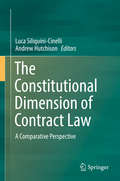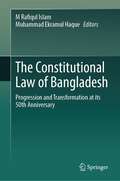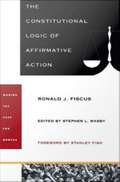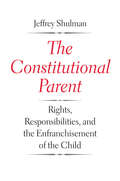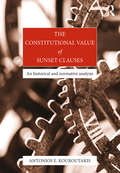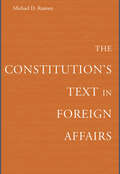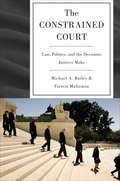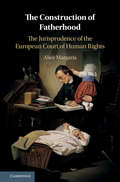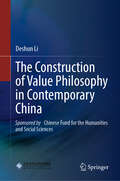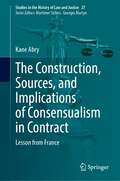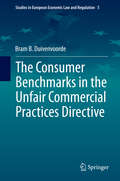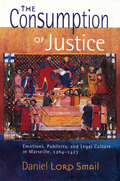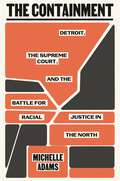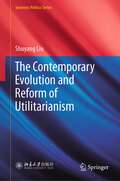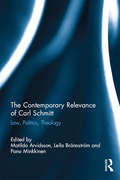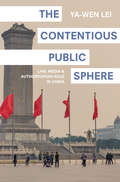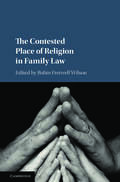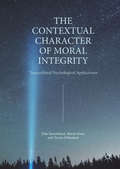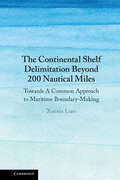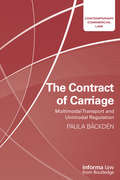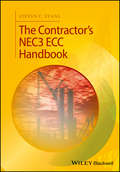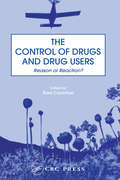- Table View
- List View
The Constitutional Dimension of Contract Law
by Luca Siliquini-Cinelli Andrew HutchisonDelving into the interplay between human rights policies, constitutional law, and contract law from both theoretical and practical perspectives, this book offers a totally new reappraisal of the subject by gathering a collection of essays written by comparative and contract law scholars from Europe, Africa, Asia, Canada, and Australia. Instead of providing the reader with a sterile compilation of positivistic norms and policies on the impact of fundamental (human) rights and constitutional law issues on contract law's development, the authors build on their personal experience to analyse specific topics related to contracting which include a constitutional dimension. The book fills an important void in comparative law scholarship in so representing the starting point for further debate on the subject. One of the hallmarks of the present era is the discourse surrounding human rights and the necessity that the law take cognisance of these. Various national and supranational human rights instruments have been developed and implemented in order to transition society away from atrocity and callousness toward a more just and inclusive future. In some countries this is done through the mechanism of a supreme Constitution, while in others international conventions or ordinary legislation hold sway. Contract law plays a pivotal role in this phenomenon. This is done through the debated 'civilising mission' of the contract, a notion which itself constitutes the canon of the Western liberal principle of 'civilised economy'. The movement from the belief in the absolute freedom of contract which characterised socio-legal thought in the eighteen century, to the principles of fairness and justice which underpin the law of contract today is testament to this.
The Constitutional Law of Bangladesh: Progression and Transformation at its 50th Anniversary
by M Rafiqul Islam Muhammad Ekramul HaqueThis book provides a supportive lending hand to researchers of constitutional law worldwide about the constitutional law of Bangladesh. Moreover, this book discusses the evolution and development of the constitutional law of Bangladesh over 50 years from its embryonic stage with reference to comparative constitutional law. This book is a very useful resource for the comparative constitutional researchers as readers will be able to easily interpret the constitutional law of Bangladesh from national, regional and global constitutional law perspectives.This book celebrates the fiftieth anniversary of the Constitution, the first of its kind to portray the journey of constitutionalism in Bangladesh comprehensively with intellectual observations and palatable recommendations for improvement. This book looks back to the constituent assembly debates, intention of the constitution makers and how have those dreams and aspirations have come into realities, what goals have been achieved, what caused some failures, and what should be its future directions. At such a momentous point in history, it is imperative that its native and foreign constitutional authoritative voices scholarly assess the constitutional design, understand the reasons for its successes and occasional failures, and ventilate their views towards its progressive development to elevate it to a new height in the 21st century and beyond.The book chapters discuss not only the text of the constitution and some judicial precedents, rather involve in a much larger task of unveiling the interpretative approach of the Constitution from a comparative constitutional law perspective. This book shall project the future roadmap for the journey of constitutionalism in Bangladesh throughout all chapters offering policy recommendations for the revision of the Constitution.
The Constitutional Logic of Affirmative Action
by Ronald J. FiscusFew issues are as mired in rhetoric and controversy as affirmative action. This is certainly no less true now as when Ronald J. Fiscus's The Constitutional Logic of Affirmative Action was first published in 1992. The controversy has, perhaps, become more charged over the past few years. With this compelling and rigorously reasoned argument for a constitutional rationale of affirmative action, Fiscus clarifies the moral and legal ramifications of this complex subject and presents an important view in the context of the ongoing debate. Beginning with a distinction drawn between principles of compensatory and distributive justice, Fiscus argues that the former, although often the basis for judgments made in individual discrimination cases, cannot sufficiently justify broad programs of affirmative action. Only a theory of distributive justice, one that assumes minorities have a right to what they would have gained proportionally in a nonracist society, can persuasively provide that justification. On this basis, the author argues in favor of proportional racial quotas--and challenges the charge of "reverse discrimination" raised in protest in the name of the "innocent victims" of affirmative action--as an action necessary to approach the goals of fairness and equality. The Constitutional Logic of Affirmative Action focuses on Supreme Court affirmative action rulings from Bakke (1976) to Croson (1989) and includes an epilogue by editor Stephen L. Wasby that considers developments through 1995. General readers concerned with racial justice, affirmative action, and public policy, as well as legal specialists and constitutional scholars will find Fiscus's argument passionate, balanced, and persuasive.
The Constitutional Parent
by Jeffrey ShulmanIn this bold and timely work, law professor Jeffrey Shulman argues that the United States Constitution does not protect a fundamental right to parent. Based on a rigorous reconsideration of the historical record, Shulman challenges the notion, held by academics and the general public alike, that parental rights have a long-standing legal pedigree. What is deeply rooted in our legal tradition and social conscience, Shulman demonstrates, is the idea that the state entrusts parents with custody of the child, and it does so only as long as parents meet their fiduciary duty to serve the developmental needs of the child. Shulman’s illuminating account of American legal history is of more than academic interest If once again we treat parenting as a delegated responsibility#151;as a sacred trust, not a sacred right#151;we will not all reach the same legal prescriptions, but we might be more willing to consider how time-honored principles of family law can effectively accommodate the evolving interests of parent, child, and state.
The Constitutional Protection of Private Property in China
by Chuanhui WangThis timely book reviews the changes in legal reform around the constitutional protection of private property in China since 1949. Using a comparative approach, it analyses the development of property theories and the various constitutionalisation models and practices of private property in representative countries including the United States, Canada, Germany, India and China. It also explores the interwoven social forces that have been driving the evolution of the constitutional protection of private property in China. By comparing China with the United States, Germany and India, the author reveals the unfairness, unjustness and insufficiency in China's application of three constitutional doctrines – public use, just compensation and due process or procedure. The book concludes by predicting future progress and suggests feasible measures for gradual reform that will be compatible with China's existing political system.
The Constitutional Value of Sunset Clauses: An historical and normative analysis
by Antonios Emmanouil KouroutakisIn recent years, sunset clauses have mostly been associated with emergency legislation introduced in the wake of terrorist attacks. However, as this book demonstrates, they have a long history and a substantial constitutional impact on the separation of powers and the rule of law. In addition, the constitutional value of such clauses is examined from certain neglected normative aspects pertaining to concepts such as deliberative and consensus democracy, parliamentary sovereignty and constitutional dialogue. The work is an amalgam of three perspectives: the historical, the positive and the normative. All three are intertwined and each subsequent part builds upon the findings of the previous one. The historical perspective investigates the historical development of sunset clauses since the first Parliaments in England. The positive perspective examines the legal effect and the contemporary utility of sunset clauses. Finally, the normative perspective analyses their interaction with several models of separation of powers, and their influence on the dialogue between various institutions as it values their impact on the rule of law, formal and substantive. The detailed examination of this topical subject will be a valuable resource for academics, researchers and policy makers.
The Constitution’s Text in Foreign Affairs
by Michael D. RamseyThis book describes the constitutional law of foreign affairs, derived from the historical understanding of the Constitution's text. It examines timeless and recurring foreign affairs controversies--such as the role of the president and Congress, the power to enter armed conflict, and the power to make and break treaties--and shows how the words, structure, and context of the Constitution can resolve pivotal court cases and leading modern disputes. The book provides a counterpoint to much conventional discussion of constitutional foreign affairs law, which tends to assume that the Constitution's text and history cannot give much guidance, and which rests many of its arguments upon modern practice and policy considerations.Using a close focus on the text and a wide array of historical sources, Michael Ramsey argues that the Constitution's original design gives the president substantial independent powers in foreign affairs. But, contrary to what many presidents and presidential advisors contend, these powers are balanced by the independent powers given to Congress, the Senate, the states, and the courts. The Constitution, Ramsey concludes, does not make any branch of government the ultimate decision maker in foreign affairs, but rather divides authority among multiple independent power centers.
The Constrained Court: Law, Politics, and the Decisions Justices Make
by Forrest Maltzman Michael A. BaileyHow do Supreme Court justices decide their cases? Do they follow their policy preferences? Or are they constrained by the law and by other political actors? The Constrained Court combines new theoretical insights and extensive data analysis to show that law and politics together shape the behavior of justices on the Supreme Court. Michael Bailey and Forrest Maltzman show how two types of constraints have influenced the decision making of the modern Court. First, Bailey and Maltzman document that important legal doctrines, such as respect for precedents, have influenced every justice since 1950. The authors find considerable variation in how these doctrines affect each justice, variation due in part to the differing experiences justices have brought to the bench. Second, Bailey and Maltzman show that justices are constrained by political factors. Justices are not isolated from what happens in the legislative and executive branches, and instead respond in predictable ways to changes in the preferences of Congress and the president. The Constrained Court shatters the myth that justices are unconstrained actors who pursue their personal policy preferences at all costs. By showing how law and politics interact in the construction of American law, this book sheds new light on the unique role that the Supreme Court plays in the constitutional order.
The Construction of Fatherhood: The Jurisprudence of the European Court of Human Rights
by Alice MargariaThis book tackles one of the most topical socio-legal issues of today: how the law - in particular, the European Court of Human Rights - is responding to shifting practices and ideas of fatherhood in a world that offers radical possibilities for the fragmentation of the conventional father figure and therefore urges decisions upon what kind of characteristics makes someone a legal father. It explores the Court's reaction to changing family and, more specifically, fatherhood realities. In so doing, it engages in timely conversations about the rights and responsibilities of men as fathers. By tracing values and assumptions underpinning the Court's views on fatherhood, this book contributes to highlight the expressive powers of the ECtHR and, more specifically, the latter's role in producing and legitimising ideas about parenting and, more generally, in influencing how family life is regulated and organised.
The Construction of Property: Norms, Institutions, Challenges
by Amnon LehaviThe Construction of Property identifies the structural and institutional foundations of property, and explains how these features can accommodate various normative agendas. Offering rich and cutting-edge analysis, the book studies the spectrum of property regimes including private, common and public property as well as innovative forms of property hybrids such as US-style residential community associations, the British Private Finance Initiative, the Israeli Renewing Kibbutz, community land trusts and grassroots phenomena of property ordering in publicly-owned open spaces. It also investigates the protagonists of property beyond the individual and the state, identifying the key role that community organisations and business corporations play for both the private and public aspects of property. The book then addresses property's greatest challenge: the move from a largely domestic legal construct into one that accommodates the increasing social and economic forces of globalisation.
The Construction of Value Philosophy in Contemporary China
by Deshun LiThis book approaches humanism in the new era in China by discussing the nature of value philosophy and by analyzing in depth the significance of value research for China’s modernization and future development. The author expounds his own point of view on the value of human beings as the foundation of value philosophy and subsequently applies it to understanding conflicting values between China and the West, universal values, etc. In addition, he discusses the cultural value concept in China, e.g., the craze for traditional Chinese culture, value choices in socialism with Chinese characteristics, and Deng Xiaoping’s great practice. Combining the fields of academic study, political affairs, cultural communication, and social life, the book offers a valuable resource for scholars, researchers, politicians, diplomats, university students, and those who want to study and understand value philosophy, Chinese value research, and Chinese culture. In addition, it seeks to realize the value of human beings in culture. Lastly, its discussions on the value concept can facilitate understanding and respect among people(s) all over the world.
The Construction, Sources, and Implications of Consensualism in Contract: Lesson from France (Studies in the History of Law and Justice #27)
by Kane AbryThis book offers a comprehensive introduction to French contract law with a focus on the role of consent and the evolution of consensualism, considering its immediate historical sources. The book provides a clear, in-depth, and analytical discussion of the contingency of consensualism and how the development of consensual ideas across time and transnational geographical settings has specifically underpinned modern French contract law, which has inspired other legal systems and continues to do so. It also challenges the macro-narratives of European legal history and redefines consensualism so that it may be properly understood, addressing its manifest contemporary misinterpretations. Thorough, engaging, well-structured and inventive, there is no other English-language scholarly work that offers a similar analysis.“This monograph makes an evident contribution to the field by offering an original interpretation of several provisions in the Code Civil which relate to the law of contract. The author demonstrates an impressive grasp of Latin, French and English sources as well as knowledge of Roman law, legal history, and contemporary French law. It is well-referenced and offers an extensive bibliography”. – Dr Stephen Bogle, Senior Lecturer in Private Law, University of Glasgow, UK“The author brings a critical perspective to bear throughout the monograph and develops a clear and quite sophisticated position on the interaction between consensualism and formalism in Roman and French law and the intervening European ius commune”. – Prof Hector MacQueen, Emeritus Professor of Private Law, University of Edinburgh, UK
The Consumer Benchmarks in the Unfair Commercial Practices Directive
by Bram B. DuivenvoordeThis book investigates the regime of consumer benchmarks in the Unfair Commercial Practices Directive and explores to what extent this regime meets each of the goals of the Directive. In particular, it assesses whether the consumer benchmarks are suitable in terms of achieving the three goals of the Directive: achieving a high level of consumer protection, increasing the smooth functioning of the internal market, and improving competition in the market as such. In addition to providing a thorough analysis of the consumer benchmarks and their relationship to the goals of the Directive, at a more practical level, the book provides insight into the working and consequences of the benchmarks that can be used in the evaluation of the Unfair Commercial Practices Directive and its application by the CJEU. This assessment is important because the Directive, while promising to regulate unfair commercial practices in a way that achieves the Directive's goals, has removed the possibility for Member States to regulate unfair commercial practices themselves.
The Consumption Of Justice: Emotions, Publicity, and Legal Culture in Marseille, 1264–1423 (Conjunctions of Religion and Power in the Medieval Past)
by Daniel Lord SmailIn the thirteenth and fourteenth centuries, the ideas and practices of justice in Europe underwent significant change as procedures were transformed and criminal and civil caseloads grew apace. Drawing on the rich judicial records of Marseille from the years 1264 to 1423, especially records of civil litigation, this book approaches the courts of law from the perspective of the users of the courts (the consumers of justice) and explains why men and women chose to invest resources in the law. Daniel Lord Smail shows that the courts were quickly adopted as a public stage on which litigants could take revenge on their enemies. Even as the new legal system served the interest of royal or communal authority, it also provided the consumers of justice with a way to broadcast their hatreds and social sanctions to a wider audience and negotiate their own community standing in the process. The emotions that had driven bloodfeuds and other forms of customary vengeance thus never went away, and instead were fully incorporated into the new procedures.
The Containment: Detroit, the Supreme Court, and the Battle for Racial Justice in the North
by Michelle Adams"Splendid . . . Adams’s book explores class as well as race, with a richness and sophistication that recall J. Anthony Lukas’s 1985 masterpiece, Common Ground." —Jeffrey Toobin, The New York Times Book ReviewThe epic story of Detroit's struggle to integrate schools in its suburbs—and the defeat of desegregation in the North.In 1974, the Supreme Court issued a momentous decision: In the case of Milliken v. Bradley, the justices brought a halt to school desegregation across the North, and to the civil rights movement’s struggle for a truly equal education for all. How did this come about, and why? In The Containment, the esteemed legal scholar Michelle Adams tells the epic story of the struggle to integrate Detroit schools—and what happened when it collided with Nixon-appointed justices committed to a judicial counterrevolution. Adams chronicles the devoted activists who tried to uplift Detroit's students amid the upheavals of riots, Black power, and white flight—and how their efforts led to federal judge Stephen Roth’s landmark order to achieve racial balance by tearing down the walls separating the city and its suburbs. The “metropolitan remedy” could have remade the landscape of racial justice. Instead, the Supreme Court ruled that the suburbs could not be a part of the effort to integrate—and thus upheld the inequalities that remain in place today. Adams tells this story via compelling portraits of a city under stress and of key figures—including Detroit’s first Black mayor, Coleman Young, and Justices Marshall, Rehnquist, and Powell. The result is a legal and historical drama that exposes the roots of today’s backlash against affirmative action and other efforts to fulfill the country's promise.
The Contemporary Evolution and Reform of Utilitarianism (Interests Politics Series)
by Shuyang LiuThis book is a monograph on contemporary utilitarianism, focusing on its evolving path and logic. It describes the evolution of utilitarianism from the classical model to the contemporary model and then summarizes the characteristics of contemporary utilitarianism, revealing its advantages and disadvantages. This book points out that the best characteristic of contemporary utilitarianism is to give up traditional view of individualism and take balanced attitude to the relationship between individual and community. The change makes the goal of contemporary utilitarianism from the pursuit of maximizing the sum of individual utilities to optimal social utility. Therefore, the contemporary utilitarianism gradually evolves a public philosophy with multiple interests structure, which provides a new way to solve the contradiction between personal interest and public interest.Utilitarianism is still an important political philosophy in western society, but its existing defects actually make it difficult to have a transformative impact on western institutional structure and system. The target audience of this book are students and researchers majoring in politics and ethics.
The Contemporary Relevance of Carl Schmitt: Law, Politics, Theology
by Panu Minkkinen Matilda Arvidsson Leila BrännströmWhat does Carl Schmitt have to offer to ongoing debates about sovereignty, globalization, spatiality, the nature of the political, and political theology? Can Schmitt’s positions and concepts offer insights that might help us understand our concrete present-day situation? Works on Schmitt usually limit themselves to historically isolating Schmitt into his Weimar or post-Weimar context, to reading him together with classics of political and legal philosophy, or to focusing exclusively on a particular aspect of Schmitt’s writings. Bringing together an international, and interdisciplinary, range of contributors, this book explores the question of Schmitt’s relevance for an understanding of the contemporary world. Engaging the background and intellectual context in which Schmitt wrote his major works – often with reference to both primary and secondary literature unavailable in English – this book will be of enormous interest to legal and political theorists.
The Contentious Public Sphere: Law, Media, and Authoritarian Rule in China
by Ya-Wen LeiSince the mid-2000s, public opinion and debate in China have become increasingly common and consequential, despite the ongoing censorship of speech and regulation of civil society. How did this happen? In The Contentious Public Sphere, Ya-Wen Lei shows how the Chinese state drew on law, the media, and the Internet to further an authoritarian project of modernization, but in so doing, inadvertently created a nationwide public sphere in China—one the state must now endeavor to control. Lei examines the influence this unruly sphere has had on Chinese politics and the ways that the state has responded.Using interviews, newspaper articles, online texts, official documents, and national surveys, Lei shows that the development of the public sphere in China has provided an unprecedented forum for citizens to influence the public agenda, demand accountability from the government, and organize around the concepts of law and rights. She demonstrates how citizens came to understand themselves as legal subjects, how legal and media professionals began to collaborate in unexpected ways, and how existing conditions of political and economic fragmentation created unintended opportunities for political critique, particularly with the rise of the Internet. The emergence of this public sphere—and its uncertain future—is a pressing issue with important implications for the political prospects of the Chinese people.Investigating how individuals learn to use public discourse to influence politics, The Contentious Public Sphere offers new possibilities for thinking about the transformation of state-society relations.
The Contested Place of Religion in Family Law
by Robin Fretwell WilsonLike many beliefs, religious views matter across an individual's life and the life cycle of a family - from birth to marriage, through child-rearing, and, eventually, death. This volume examines clashes over religious liberty within the personal realm of the family.<P><P> Against swirling religious beliefs, secular values, and legal regulation, this volume offers a forward-looking examination of tensions between religious freedom and the state's protective function. <P>Contributors unpack some of the Court's recent decisions and explain how they set the stage for ongoing disputes. They evaluate religious claims around birth control, circumcision, modesty, religious education, marriage, polygamy, shared parenting, corporal punishment, faith healing, divorce, and the end of life. Authors span legislators, attorneys, academics, journalists, ministers, physicians, child advocates, and representatives of minority faiths. The Contested Place of Religion in Family Law begins an overdue conversation on questions dividing the nation.<P> The first book to explore the implications of Obergefell v. Hodges and Burwell v. Hobby Lobby since the election of President Trump.<P> Covers some of the most intractable and pressing social conflicts in American culture today, including faith healing, access to contraceptives, respect for minority cultures in public spaces, home schooling, the 'right' kind of marriage, claims of religious objectors not to facilitate access to emergency contraceptives, and civil marriage.<P> The authors utilize a wide range of analytical tools including: economic theory, constitutional law, social science analysis, empirical methods, historical examination of the law's development, and comparative perspectives from other countries (Israel, Australia, France, and various parts of Europe)
The Contextual Character of Moral Integrity: Transcultural Psychological Applications
by Dita Šamánková Marek Preiss Tereza PříhodováThis book discusses outcomes of a study by the National Institute of Mental Health, Czech Republic, examining moral integrity in the post-communist Czech-speaking environment. Chapters map the history of the Euro-Atlantic ethical disciplines from moral philosophy and psychology to evolutionary neuroscience and socio-biology. The authors emphasize the biological and social conditionality of ethics and call for greater differentiation of both research and applied psychological standards in today’s globalised world. Using a non-European ethical system – Theravada Buddhism – as a case study, the authors explore the differences in English and Czech interpretations of the religion. They analyse cognitive styles and language as central variables in formatting and interpreting moral values, with important consequences for cultural transferability of psychological instruments. This book will appeal to academics and other specialists in psychology, psychiatry, sociology and related fields, as well as to readers interested in the psychology of ethics.
The Continental Shelf Delimitation Beyond 200 Nautical Miles: Towards A Common Approach to Maritime Boundary-Making
by Xuexia LiaoThe Continental Shelf Delimitation Beyond 200 Nautical Miles provides an up-to-date and informed analysis of the now fast developing, yet confusing, field of the law of maritime delimitation. It examines the procedural matters in relation to the competence of international courts and tribunals in the light of the institutional framework of the United Nations Convention on the Law of the Sea and discusses the methodological questions arising out of the delimitation process. The book engages with the key concepts of maritime entitlement, delineation and delimitation with a view to developing a coherent and consistent approach to the delimitation of the continental shelf beyond 200 nautical miles. Essentially, it argues that the delimitation of the continental shelf will be unified with existing maritime delimitation, and a common approach to maritime boundary-making within and beyond 200 nautical miles is likely to emerge.
The Contract And Domination
by Charles Mills Carole PatemanContract and Domination offers a bold challenge to contemporary contract theory, arguing that it should either be fundamentally rethought or abandoned altogether. Since the publication of John Rawls's A Theory of Justice, contract theory has once again become central to the Western political tradition. But gender justice is neglected and racial justice almost completely ignored. Carole Pateman and Charles Mills's earlier books, The Sexual Contract (1988) and The Racial Contract (1997), offered devastating critiques of gender and racial domination and the contemporary contract tradition's silence on them. Both books have become classics of revisionist radical democratic political theory. Now Pateman and Mills are collaborating for the first time in an interdisciplinary volume, drawing on their insights from political science and philosophy. They are building on but going beyond their earlier work to bring the sexual and racial contracts together.
The Contract of Carriage: Multimodal Transport and Unimodal Regulation (Contemporary Commercial Law)
by Paula BäckdénThe Contract of Carriage: Multimodal Transport and Unimodal Regulation provides a new perspective on how to approach the question of multimodal transport regulation regarding liability for goods carried. Unlike previous literature, which has approached the issue of applicability from a strict interpretation-of-the-convention angle, this book will analyse the issue from a law of contracts perspective. If goods are damaged during international transport, the carrier’s liability is governed by rules laid down in international conventions, such as the CMR convention, the Hague–Visby Rules and the Montreal Convention. Such rules apply to certain modes of transport, to contracts for unimodal carriage. When goods are carried under a multimodal contract of carriage, which provides for carriage by more than one mode of transport, the question is whether these rules are applicable to transport under multimodal contracts of carriage. This book investigates the rules of carrier’s liability applicable to unimodal transport, and whether these rules are applicable to carriage under multimodal contracts of carriage, with focus on the actual contract of carriage. This unique text will be of great interest to students, academics, industry professionals, and legal practitioners alike.
The Contractor's NEC3 ECC Handbook
by Steven C. EvansAddresses the daily challenges faced by contractors who use the NEC3 ECC with clear, practical and useable advice on how to solve them Written in plain English for contractors and their staff, this book explains how the NEC3 contract works and provides answers to common questions. It presents complicated concepts in a simple, straightforward and understandable way, focusing mainly on day-to-day use. Steven Evans, an expert with thirty years of experience in construction, considers all the provisions of the contract and explains the procedures, obligations, and liabilities contained within it. NEC3 ECC is a process-based contract based on project management best practices. The basic philosophy behind it differs radically from the more adversarial approaches embodied by traditional contracts. While the NEC3 ECC may appear quite simple on the surface, it is often misunderstood and mismanaged by its day-to-day users. Despite the clear and urgent need for expert guides for those who use the NEC3 ECC, or who are considering adopting this increasingly popular contract, available books on the subject are highly technical and written for lawyers and professional consultants—until now. Written specifically for contractors using the NEC3 ECC contract, this book is aimed specifically at a level consistent with the knowledge and experiences of contractors and their staff. A practical guide to the procedures in the NEC3 Engineering and Construction Contracts Written specifically for those using and administering the contracts—not for lawyers or professional consultants Considers all the provisions of the contract and explains the procedures, obligations and liabilities Covers all NEC3 ECC versions and variations created by the Main and Secondary Options Provides clear, concise, practical, and straightforward explanations of the NEC3 ECC form used by commercial and operational staff of main contractors The Contractor's NEC3 EEC Handbook is a vital working resource for main contractors and their employees, including quantity surveyors, commercial managers, contracts managers, project managers, site managers, and estimators.
The Control of Drugs and Drug Users: Reason or Reaction?
by Ross CoomberInformed debate on how, why, or even if, drugs and those that use them should be controlled needs an insight into the background of such controls, how effective they have been and what reasonable alternatives there may be. This book seeks to provide such an insight. Reviewing important aspects of past and current drug control policies in Britain and America, the international compliment of expert contributors seek to explore the rationality of the reasoning which produced the initial controls, the continuing relevance of those currently employed, and provide alternative scenarios for future policy.
